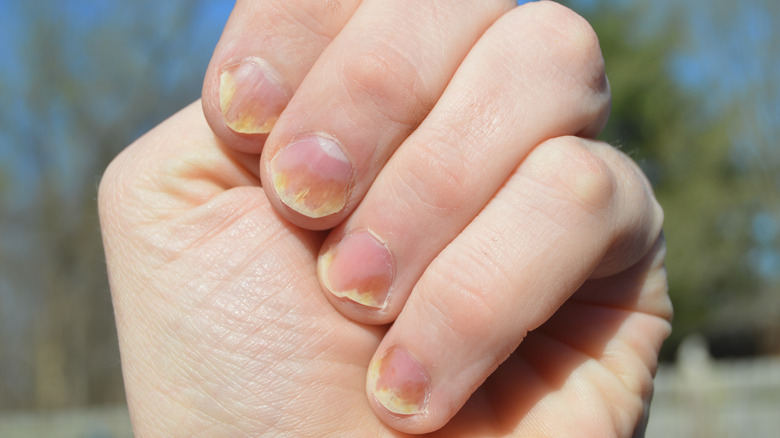Dealing With Nail Psoriasis? Here's How You Can Treat It
Nail psoriasis can pose unique challenges, especially during flare-ups. The blooming gel nail trend, pearl manicures, acrylic nails, and other forms of nail art are off-limits for those living with this condition. But leaving aesthetics aside, the disease may cause bleeding under your nails, pain, pitting, discoloration, crumbling, and grooves. According to the American Academy of Dermatology Association, these symptoms vary from mild to severe and may worsen without treatment.
About half of all people with psoriasis have their nails affected by the disease, per the National Psoriasis Foundation. In some cases, this condition is associated with psoriatic arthritis, an inflammatory joint disorder. Over time, it can become severe enough to interfere with your daily life and cause changes in nail shape, texture, or color. And if that wasn't bad enough, the disease may also put you at risk for fungal infections, warns the Psoriasis and Psoriatic Arthritis Alliance (PAPAA).
There's no cure for nail psoriasis, but you can manage its symptoms and keep them from worsening. Treating this disease is hit-or-miss, and you may need to try different approaches until you find one that works.
What's the best way to treat nail psoriasis?
Nail psoriasis is an autoimmune condition, and therefore, its symptoms last a lifetime. On the positive side, you can try different medications, laser treatments, or topical products to keep it under control. The AAD says that topical treatments, such as steroid ointments, work best for patients with mild symptoms and should be used for six months or longer. Topicals may also be effective when the disease is in its early stages.
A 2021 review featured in the journal Dermatology and Therapy recommends either corticosteroid shots or methotrexate as the first line of treatment for psoriasis involving the nail matrix, or the area located at the base of your fingernails. Topical corticosteroids and/or topical vitamin D are more suitable for those with psoriasis of the nail bed. If these treatments fail, your doctor may prescribe a vitamin D analog, stronger steroids, retinoids, or pulsed dye laser therapy.
In severe cases, psoriasis can affect three or more nails and the skin around them, according to the above review. Treatment depends on whether these symptoms are due to psoriatic arthritis or a different disease and may require the use of systemic agents, such as tofacitinib or apremilast. In clinical trials, these medications have been proven effective for nail separation, bleeding, lesions, crumbling, and other symptoms. Unfortunately, systemic drugs carry serious side effects ranging from kidney and liver problems to impaired immune function.
Medication is only one piece of the puzzle
Psoriasis medication can make it easier to manage your symptoms, but it's just one piece of the puzzle. You may also need to tweak your lifestyle and skincare routine, avoid your triggers, and get more rest. Alternative therapies may help, too. For example, the Dermatology and Therapy review recommends Lindioil, a natural extract that may work just as well as or even better than calcipotriol, a synthetic form of vitamin D. Another option is pulsed dye laser therapy, a treatment that may reduce symptom severity, suggests a 2012 study published in the Journal of the American Academy of Dermatology.
As far as your lifestyle goes, it's essential to take extra care of your nails and keep your hands moisturized, says the AAD. Researchers also advise against artificial nails because they can worsen psoriasis symptoms. Generally, it's not recommended to wear artificial nails for too long, but, in this case, you should skip them altogether and stick to nail polish. Also, refrain from biting your nails and keep them short to prevent debris buildup.
What you eat matters, too. Dr. Purvisha Patel, a dermatologist interviewed by Byrdie, recommends a diet rich in fatty fish, nuts, seeds, and other foods rich in omega-3s. She also suggests cutting back on sugar, gluten, lactose, and other inflammatory compounds. Since your skin and gut are interconnected, consider taking a daily probiotic and filling up on foods that support gut health.

